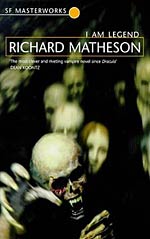
![]() DrPerschon
DrPerschon
12/29/2014
![]()
I've owned my copy of Richard Matheson's horror/SF classic I Am Legend since the early '80s, when I purchased it for pennies through a science fiction book club. It's one of the only books from that hardcover deluge that has survived multiple purges, though the dust jacket is long gone. It has long been a favourite, and I've re-read it many times.
My read for the Masterworks challenge in 2014 was the first time I'd read it since I finished my PhD. Perhaps it's the past seven years of teaching literature, but it was very indicative of how we change as readers over time. When I was a young teen reading I Am Legend, I saw Matheson's protagonist Robert Neville as a hero, the last survivor of a plague that has turned the human race into vampires. My reading was contemporaneous with my introduction to other post-apocalyptic heroes, albeit cinematic ones: Mad Max, Snake Plissken, and a host of B-list direct-to-video knock offs of those characters. Consequently, I was unable to see Neville as fully anti-hero. Killing a vampire was necessary for Neville's survival. Perhaps reading Salem's Lot around the same time further muddied the waters, since those vampires had no air of moral ambiguity in them; like the monsters in the original Beowulf poem, they are cursed by God.
But Matheson's vampires are not cursed by God. Their condition is likely the result of something mankind has done: a nuclear war, very likely. And Neville's systematic elimination of the vampires is not the eradication of god-cursed monsters, but a new race, now the dominant one on the planet. Consequently, Neville is the lone monster in his castle, and the new citizens of earth congregate regularly outside his window to demand his blood.
This doesn't make Neville the villain, but it does trouble my uncomplicated and youthful estimation of him as hero. And my subsequent readings of the book were so heavily coloured by that first impression that I never questioned it. I understood the idea that the vampires had inherited the earth, but I saw Neville's situation as fully tragic. Had my teenage self been given the chance to make a film adaptation, I'd have ended it with him going out guns blazing, rather than the brilliant and bleakly austere ending Matheson ends with.
But this reading, I noted how Matheson humanizes the vampires as Neville goes about his systematic examination of what makes them tick. He is the monster, as evidenced by his own drunken ruminations in Chapter 3 of "January 1976," but most effectively through his killing of "the woman in the bedroom" in the following chapter. Matheson's word choices in this assault are indicative of how Neville is losing his humanity. Were the woman not a vampire, we'd be reading a book about a serial killer. And since Matheson's vampires are not soulless demons, perhaps we are.
It's likely why I Am Legend continues to fascinate readers, since it does not contain a clear polemic of good vs. evil. It asks the question that is central to great science fiction: what does it mean to be human? It asks this question through a series of "what if?" questions, from "what if your loved ones became monsters?" to "how far would you go to survive?" to the obvious "what would it be like to be the last one standing?" These are the questions that set I Am Legend apart from many of the zombie narratives it inspired, from a number of post-apocalyptic stories, and from a slough of vampire tales, which is why I'll still be reading it for years to come.
http://www.steampunkscholar.com